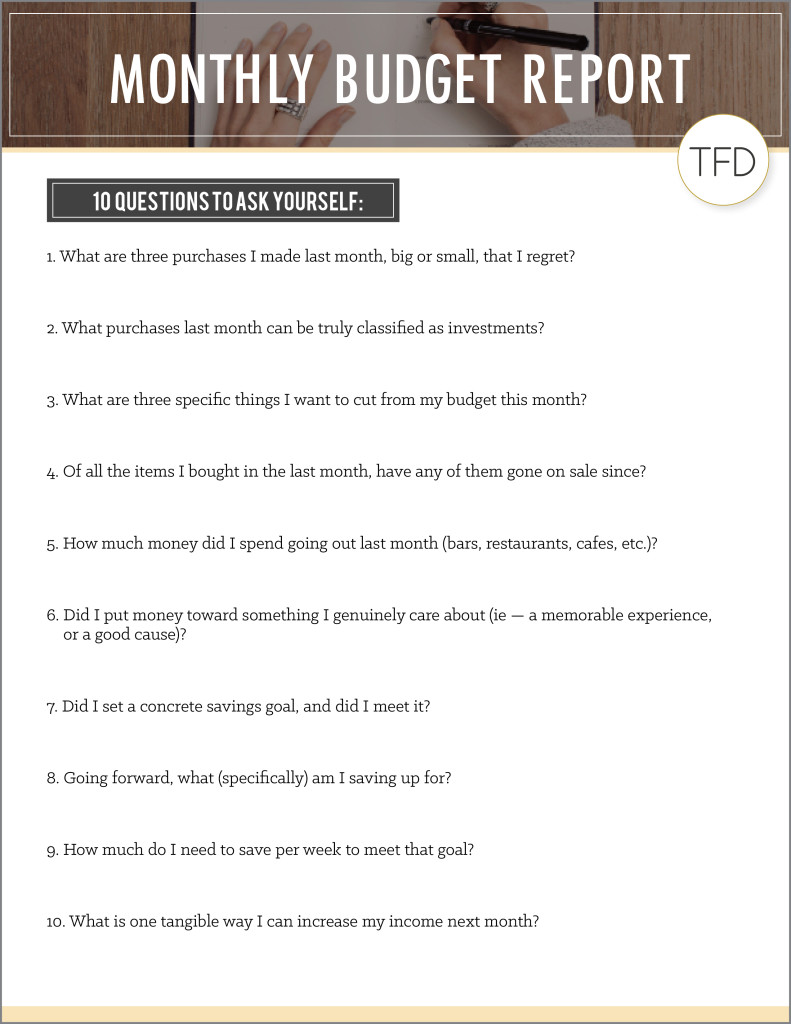TFD’s 10 Questions You Need To Ask Yourself To Build A Healthy Budget
Just yesterday, Maya posted an article which went through and tracked every single thing she spent on during the course of March — a tedious but incredibly valuable exercise. I am guilty of putting off this chore at the month’s end, and I find it painful to look at my credit/debit card transactions one by one. I sit in my chair wiggling from guilt, biting my nails, and looking for any type of distraction as I’m forced to relive the areas where I slipped. The same way Maya comically reflected on the things she didn’t need but bought anyway, I, too, look at my statements and wonder if it was the same person making all of the semi-insane purchases. For most people, setting goals is an easy task that makes us feel productive and financially responsible. However, like most things, the task is easier said than done. Most people fall off the bandwagon after one or two slip-ups and are never able to review the complete picture, because they stop tracking. I find that I, myself (along with a lot of my friends) am vocal about the changes I want to make/recently implemented, but I fail to stay in it for the long haul.
However, there are tangible ways to make long-term budgeting more fruitful, and I believe the key to that is being radically honest with yourself. Set aside thirty minutes, and endure the unpleasant task of going through your statements with a fine-toothed comb. Identify the areas you’re overspending, and address where you’re slipping up. For example, when I do, this I see the recurring patterns of spending I need to avoid (going to the grocery store like, four times a week), what days I tend to spend more (Thursdays and Fridays), and how data-overage charges on my phone REALLY add up.
You can begin to remedy this issue by increasing the amount of questions you ask yourself with regard to your spending and saving habits. Personally, one of my biggest issues is that I assign goals, values, and percentages to my spending and saving, but I don’t account for how a variety of factors might prevent me from reaching those goals. Asking questions about the upcoming month would keep these factors top of mind. For example, I do a bad job at anticipating how small events like a birthday celebration, a friend coming into town, or a few visits to my family back in NJ can derail my budget. When you set expectations and practice setting up new goals and percentages with fresh eyes at the start of each month, you’ll have an easier time staying on track. (There are also a ton of resources to help you adjust your budget/set expectations if your income changes month-to-month.) Regardless of what your goals are, doing a “post-mortem” at the end of each month (the way Maya did) is a super useful to stay on top of your spending habits. It’s a good way to learn from your mistakes, and it reinforces the way you feel — good or bad. It’s much more difficult to brush off problems and ignore them if you’re forcing yourself to sit down and confront them repeatedly.
Forcing yourself to sit down and answer the ~tough questions~ is the only way to ensure you’re staying on top of your budget, and remain honest with yourself. You can even print out the document, fill it out at the end of each month, and keep it in a folder along with the rest of your receipts, bills, statements, etc. It might seem tedious, but taking time to track and reflect on your spending habits is essential to becoming more financially fit. It’s Spring cleaning for your budget, and there’s no better time to whip it into shape!
With that said, we created ten questions to help whip your budget into shape. These questions are meant to be a quick, concise, and thorough way of analyzing past financial decisions while focusing on future goals.
We also created a version of these questions on Google Sheets that everyone can download & fill out. It’s a great idea to keep it on hand as a way to compare answers each month to see where you’re succeeding, and where you could be doing better. Check it out!
Image via Unsplash






